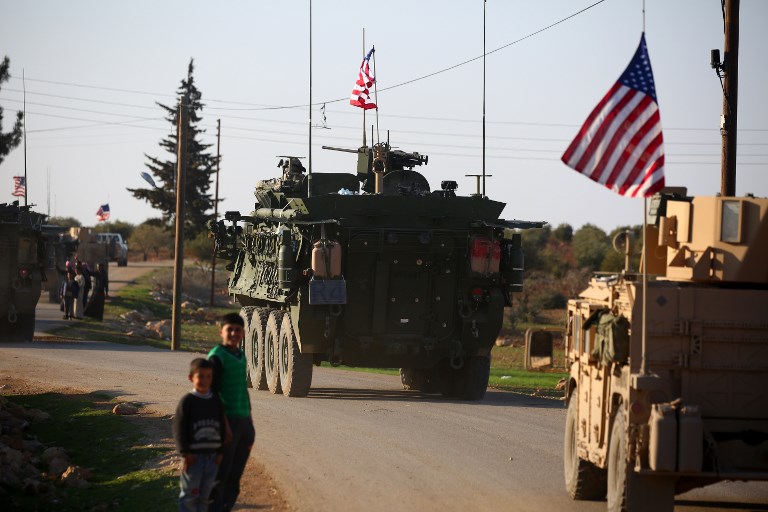Winners and losers in Trump’s Syrian debacle

Daesh may not be in the market for early Christmas presents but the out-of-the-blue decision of President Donald Trump to withdraw US forces from Syria is a gift unlikely to be turned down. Other beneficiaries of the president’s yuletide generosity could be Iran, Russia, Turkey and the Syrian regime.
Foreign and external interference in Syria has been rampant for the past six or so years, with little to no positive effect. The pullout of US forces will be viewed differently by the various constituencies affected. Many Syrians will always feel more comfortable with Uncle Sam outside their country than in, and following the near obliteration of Raqqa, may even celebrate. Other Syrians will fear the maelstrom of chaos and feeding frenzy that will follow.
The potential winners include many of the enemies President Trump has vowed to defeat, not least Daesh whose adherents gloated on social media. Iran can operate even more freely across Syria, reinforcing its land bridge from Tehran to Beirut. The Syrian regime will look to benefit, not least from Kurdish groups likely to reach out to it for protection from Turkish advances. A race to Raqqa may kick off again. President Putin made no secret of his support for the American move, which he will see as explicit American acceptance that Syria is Russian turf.
President Erdogan of Turkey was pleasantly shocked when Trump informed him during their phone conversation, even alerting him to the dangers of a premature withdrawal. Erdogan has promised Trump to cleanse Syria of Daesh, triggering inevitable fears of a Turkish advance southwards.
Conversely, the Syrian Defense Forces, in particular the Kurds in the form of the People’s Protection Units (YPG), have been used and dumped. At some point this was going to happen given that the US has no appetite for backing Kurdish aspirations, but the speed and timing of the decision will have shocked America’s now former Kurdish allies. Trump is not the first to do this to them; he will not be the last. Those with even a vague awareness of history will recall 1991, when having encouraged Iraqi Kurds to rise up against the brutal regime of Saddam Hussein in Iraq, the US just abandoned them to be crushed.
Trump does not do alliances and partnerships merely temporary arranged marriages of convenience, often lubricated by millions of dollars.
Chris Doyle
The Arab elements of the Syrian Defense Forces are already melting away. Many had fought for the pay, not for ideology. Syrians in Raqqa have mixed feelings; the uncertainty is scary, but many privately admit that after years of enduring rule by militias, and the current Kurdish rule of this Arab-majority city, some measure of state control could be beneficial.
Another loser will be American allies. Powerful shockwaves of unease and disquiet have permeated across the corridors of the powerful and the homes of the powerless. Across the globe many will recalculate their strategies to shield their interests from the capricious decision making in Washington and the dissonance in the Trump administration. The long telephone call between Israeli Prime Minister Netanyahu and Trump indicates considerable Israeli unease, both at the treatment of the Kurds but also the gift to Iran. “This is a US decision and we will study its timetable, its implementation and its repercussions for us,” Netanyahu commented coldly.
But in the tally of winners and losers, the greatest loser could yet be the US. Yes, pulling back forces from a zone of protracted conflict has an upside, not least because the US has only a small presence of 2,000 troops and no strategic interest there. But the sudden and unplanned nature of this announcement risks American influence in the Middle East plummeting. Claims of wanting to annihilate Daesh and thwart Iran have been exposed as hollow soundbites.
The only way to justify intervening in both Syria and Iraq was to give the sacrifice real meaning. Exiting with the job of defeating Daesh half done risks the worst of all worlds, with blame from both those who supported and those who opposed US involvement. It is akin to taking only half a course of antibiotics, when the disease comes back even stronger and more deadly.
Trump’s claim of victory over Daesh was half hearted. He did not announce this triumph surrounded by crowds of enthusiastic applauding politicians and generals, but on Twitter and in a video. By his standards, this was ultra-low wattage.
The wattage dropped even further when Defense Secretary James Mattis stole the headlines by resigning, leaving in no doubt his disagreement with Trump. Mattis did not approve of leaving friends in the lurch.
Trump does not do alliances, and his partnerships are merely temporary arranged marriages of convenience, often lubricated by millions of dollars. Turkey and President Erdogan are back in the Trump circle — for now. President Macron of France was once a favorite, but not any more. The North Korean leader went from rocket man to being a “funny guy” who is “very smart.”
Those yet to figure this out are likely to get burned, not least as the more traditionally minded figures of the administration are tweeted out to grass. Quite what this most transactionally minded of presidents sees as the US benefit remains unclear.
- Chris Doyle is director of the London-based Council for Arab-British Understanding (CAABU). Twitter: @Doylech









































